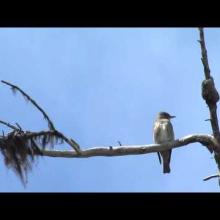

Join BirdNote tomorrow, November 30th!
Illustrator David Sibley and actor H. Jon Benjamin will face off in the bird illustration battle of the century during BirdNote's Year-end Celebration and Auction!
These days we're hearing the song of the Olive-sided Flycatcher less often. Clear-cutting and fire suppression in forests, along with acid rain, has reduced its available habitat. Pesticides affect the supply of food. American Bird Conservancy has named it a priority species for conservation. Protecting boreal forest and other suitable habitat in the U.S. and Canada and creating sanctuaries in South America will conserve the flycatcher at both ends of its annual journey. The goal is to ensure that it can sing its unique song well into the future.
This show brought to you by the Lufkin Family Foundation.
BirdNote®
Olive-sided Flycatcher – Preserving a Unique Voice of the Forest
Written by Bob Sundstrom
This is BirdNote!
[Olive-sided Flycatcher song]
Ah, the whistled melody of an Olive-sided Flycatcher! The song carries for hundreds of yards along a forest edge. [Olive-sided Flycatcher song] Its three notes are distinctive. Some liken the song to the phrase: “Quick, three beers!” [Olive-sided Flycatcher song]
Olive-sided Flycatchers nest across the northern tier of the United States and into Canada. They prefer sites that offer isolated tall trees and snags, which they use as hunting perches. They sally forth to snatch up flying insects such as bees, wasps, and moths. Each winter, these flycatchers migrate all the way to the northern Andes of South America.
These days we’re hearing the song of the Olive-sided Flycatcher less often. [Olive-sided Flycatcher song] Clear-cutting and fire suppression in forests, along with acid rain, has reduced its available habitat. Pesticides affect the supply of food. American Bird Conservancy has named it a priority for conservation. Promising actions are underway at both ends of the flycatchers’ journey — like protecting boreal forests in the U.S. and Canada and creating sanctuaries in South America. The goal is to ensure that the Olive-sided Flycatcher sings its unique song well into the future. [Olive-sided Flycatcher song]
Today’s show brought to you by the Lufkin Family Foundation. There’s more to the story on birdnote.org.
###
Call of the Olive-sided Flycatcher provided by The Macaulay Library of Natural Sounds at the Cornell Lab of Ornithology, Ithaca, New York; recorded by T.G. Sander.
BirdNote's theme music was composed and played by Nancy Rumbel and produced by John Kessler.
Producer: John Kessler
Executive Producer: Chris Peterson
© 2015 Tune In to Nature.org June 2018/2020 Narrator: Mary McCann
ID# SotB-OSFL-01-2011-06-18







